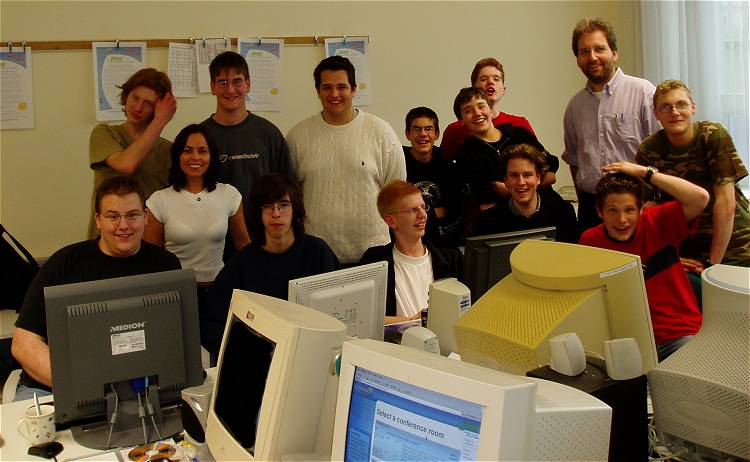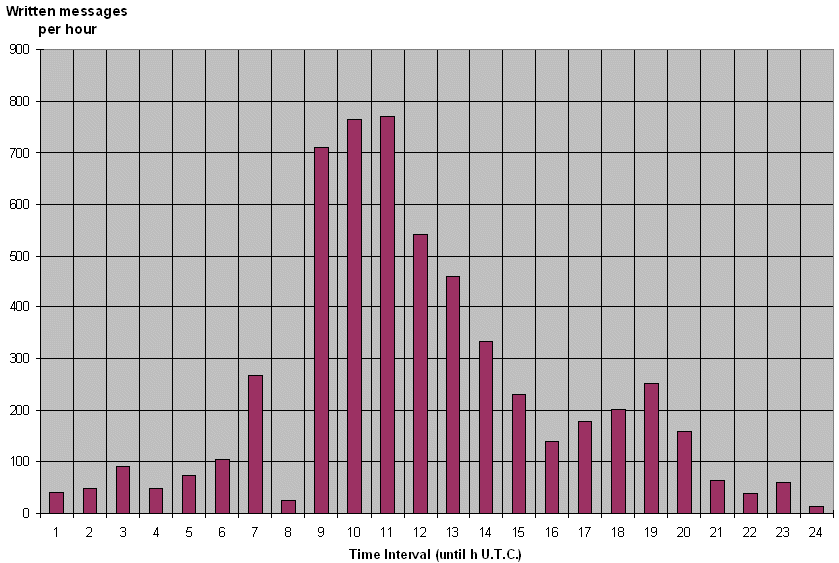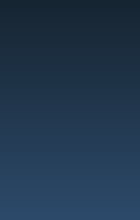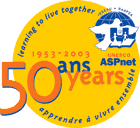Agenda 21 NOW! 2004 and
2005...
The Internet Conference for
students in its fifth and sixth year
by
Martin Jarrath
Looking back
from the moment when I am writing these lines (27 October, 2004) it is
now five
and a half years ago that we first announced our idea of a worldwide
internet
conference for students in March 1999 in Sodankylä / Finland (yes,
the
Sodankylä beyond the Arctic circle, and Finland, those days were a
terrific
experience I’ll never forget!) during one of the BSP consultation
meetings.
Since then, five annual Internet conferences called “Agenda 21 NOW!”
have taken
place in the years 2000 to 2004, and we are in the middle of the
preparation of
the sixth conference on 10 February, 2005.
The story
about the making of
the Agenda 21 NOW! Internet conferences 2000 to 2003 has been told in
[2] and
[3]. UNESCO
ASPnet Germany [4]
made Agenda 21 NOW! a pilot project in late 2002. Since the
conference on
“Borders and Diversity” on 25 April, 2003 the project has expanded:
Until then
two German schools had been preparing and running the conference:
Anna-Schmidt-School in Frankfurt am Main, where it all started in 2000,
and
Kandel Comprehensive School in Kandel, they joined in 2001. In summer
2003 I
changed my working environment to Hindenburg-Gymnasium Trier in the far
west of
Germany. Moreover, in early 2003 Agenda 21 NOW! became part of the
Comenius
Project “Environmental and Cultural History of the Baltic Sea Region”:
The four
participating schools, not surprisingly all of them BSP-schools,
decided to
make the preparation and the conference itself a part of their project
work.

The team in Trier together with Jolanta Mol, Katowice (Poland) the general coordinator of the
Baltic Sea Project, on 26 April, 2004.
Hence, since
the 2004
conference we are six schools cooperating to run “Agenda 21 NOW!”: Anna-Schmidt-School (Frankfurt am Main),
Kandel Comprehensive
School (Kandel) and Hindenburg-Gymnasium
Trier in
Germany, Amtsgymnasium
Sønderborg in Denmark, Konopnicka
Secondary School in Katowice, Poland and Tartu Tamme
Gymnasium in Tartu, Estonia.
This expansion
lead to some changes in the cooperation structure, e.g. a change in the
decision making process within “Agenda 21 NOW!”: In the past the
conference
theme and the title had been adopted by all members of the team in a
meeting
about six months before the conference. Since all participating schools
were
located in Germany, such a meeting with more or less all team members
was no
problem. This time it was completely different: It had to be delegates
of all
six schools during a regular Comenius Project meeting in Kandel in
November
2003. It took us, teachers and students from all the six schools, one
day to
decide the theme as well as the title: “Focus on Food – Shape (y)our
future
NOW!”.
Another change
has taken place on our website: In late 2003 we introduced interactive
pages.
The idea of
Agenda 21 NOW! is to have quality discussions among students (and
teachers) who
have prepared for the conference, e.g. during ordinary school lessons.
Students
and teachers who want to work on our conference theme prior to the
conference
may find different kinds of information as well as selected links on
our website.
Many of the preparatory articles there had been written by students of
Anna-Schmidt-School and Kandel Comprehensive School in the past.
Now all
these pages are
interactive, in wiki technology. This means: All preparatory texts and
images
(again being written by students from the Agenda 21 NOW!-schools),
including
the material from all the former conferences, are now available in a fully
editable format. Hence, every registered participant may edit every
sentence written on any of the interactive
pages, the
participants may add new words, sentences, pictures or even new pages –
and
also erase them, if they like to!
In fact,
such erasures have
never happened.
As in many
other examples –
the most famous and most successful one is the fantastic online
encyclopedia
Wikipedia [5] – this structure has not at all proven the typical
teachers’
fears I also had when I heard of it for the first time (a lot of low
quality
and least quality stuff expected). The interactive pages developed the
way
Wikipedia and most other wikis on the net developed: the content
quality and
quantity are in time rising. Participants voluntarily added their own
knowledge, we found mistakes being corrected, rewritten paragraphs and
also new
contributions. All this more or less worked on its own, surprisingly
(or not
surprisingly, as Wikipedia and other wikis show) without any
need for
active quality management by the Agenda 21 NOW! team.
As in 2000
and 2002, the
conference 2004 took place on the German ASPnet’s international action
day,
this year on Monday, 26 April.
A good
conference needs good
moderators. Therefore, on Friday and Saturday before the conference the
moderators of the German schools – most of them upper secondary
students –met
for the traditional moderators’ training course in Kandel, being joined
by
Jolanta Mol, the new BSP general coordinator from Poland, who we had
invited
for the conference. The upper secondary students from the three German
Agenda
21 NOW!-schools learned about the special role a moderator plays in a
conference and how to say (i.e. write) things adequately in different
communication situations.
After these
two demanding
days for the team there was only a short time for relaxation. The team
in Trier
was to open the conference at 00:00 h U.T.C. on Monday – 2 a.m. our
local time
– so we met at school at 10 p.m. on Sunday evening to get the technical
equipment ready for the conference.
As always
the conference took
place in a closed area on the Internet with conference rooms and
workshops,
open exclusively for the 1,160 registered participants from 50
countries
holding a ticket for the conference. Quick registration during the
conference
was also possible, and we manually checked all registrations for
quality
reasons.
During the
conference the
team of moderators in Trier, working during the entire 24 hours, had an
exciting time, with somewhat calm periods during the first and final
hours and
intense activity especially in late morning and on midday, as shown in
fig. 1.,
i.e. in Europe’s and Africa’s morning and midday. As
the great
majority of the registered participants was from Europe and Africa
(among the
1-10 countries only Indonesia was in a considerably different time
zone) this
shows very clearly when and where Agenda 21 NOW! is used most: at
school,
during lessons.
This is
exactly what we had
always intended: making an offer for ordinary school lessons, giving
teachers
and students the opportunity to make use of the unique facilities of
Internet
communication. Fig. 1 (see below) also reflects a 40 min web server
breakdown at best
conference time in the morning which naturally caused a terrible lot of
frustration within the team and most probably among many participants,
however,
after relaunch for more than three hours the communication activity was
higher than
at any time during any of the former conferences, and for the
moderators it was
demanding to follow the discussions and do their job properly during
these
hours.
The
discussions were intense,
at least many of them. Once again our impression was that many
participants
were well-prepared, very interested and looking forward to meeting
participants
and experts from other corners of the globe. As always, some
discussions were
also very emotional, this was the time when the moderators had to do
their very
best to help the participants understand each other and thus calm down
bad
emotions.
Despite our
40 min breakdown
and –14% participants (compared to 2003) we had +28 % written
contributions and
I dare say, of higher average quality than in 2003. This happened
despite the
fact that we did not have the Iraq war more or less as a conference
theme (as
in 2003) and “Focus on food” presumably did not nearly hit the users’
emotions
as did our conference theme in early April 2003.
For me, this
very well shows
the important role of skilled moderators in the Agenda 21 NOW! schools.
14 of
them were students from Trier, my new school, and they voluntarily
(nobody
promised them good marks for this) did a technical as well as a
moderators’ job
during 28 and a half hours without sleep in between: Never before have
I seen
such a fantastic group of well cooperating, constantly seriously
working
students. Thank you, folks, this was outstanding, you have done a great
job!!!
Thanks also
to everybody
else, teachers, students and all the other cooperating people in the
Agenda 21
NOW!-schools. Unfortunately I did not personally, live and in colour,
see you
working, but it was a smashing day and an excellent cooperation!
The next conference will be
on Thursday, 10 February 2005, about “Sustainable Consumption
and
Recycling”. Teachers and students from the Baltic Sea region
and all
other parts of the world are again invited to register on our website
and be
with us during the conference. All registered participants are again
welcome to
use our website to prepare for the conference and to write their
contributions
in our Interactive Pages – be it slight corrections or a complete
article – ,
and we are looking forward to the challenge of a sixth conference.
May we
invite you?
See you on
the net!
(Written
in October 2004.)
Martin
Jarrath
Agenda 21 NOW! coordinator
Hindenburg-Gymnasium Trier
Augustinerstr. 1
D-54290 Trier
Germany
Phone +49 651 9795 0
Fax +49 651 9795 299
E-mail jarrath@agenda21now.org
http://www.agenda21now.org
Agenda 21
NOW! is technically
sponsored by CEMA AG, an IT company from Mannheim, Germany, http://www.cema.de
[1] Agenda
21 NOW! on the
Internet:
http://www.agenda21now.org
[2] Jarrath,
Martin: The
Agenda 21 NOW! story, 2003.
http://www.agenda21now.org/index.php?s=87Su296g3S&at=agendastory
[3] Jarrath,
Martin: From
Local to Global. In: Birthe Zimmermann
(Ed.): Baltic 21. An Agenda 21 for the
Baltic Sea Region. Copenhagen
2003, pp. 130-136.
[4] UNESCO
ASPnet Germany
website (in German language)
http://www.ups-schulen.de
[5]
Wikipedia, the free
encyclopedia. Available in many languages, currently (26 Oct. 2004) 17
languages with more than 10,000 articles each. English language version:
http://www.wikipedia.org
Fig. 1: Conference activity during the conference on 26 April, 2004

Annotation:
Times are given
as ending time in U.T.C., e.g. “11” (the most active time interval)
means 10-11
h U.T.C., which is 12-13 h local daylight time (e.g. Sweden, Denmark,
Germany,
Poland), 13-14 h (e.g. Estonia, Finland), 14-15 h (Western Russia)
respectively
in the Baltic Sea Region.

(c) Agenda 21 NOW! 1999-2016.We are not responsible for the content of linked pages.
E-mail to webmaster: webmaster@agenda21now.org
|









